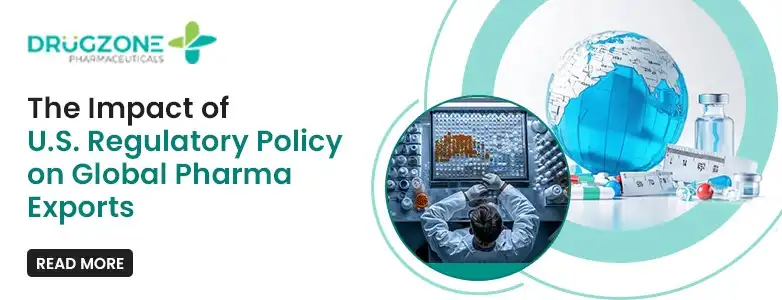
Posted On: July 18, 2025
The Impact of U.S. Regulatory Policy on Global Pharma Exports
The United States is one of the biggest markets for pharmaceutical exports. It also sets many of the rules that other countries follow.
When the U.S. changes its regulatory policies, it affects the entire pharmaceutical supply chain. From pricing and availability to supply routes and innovation, every part of the process can feel the impact.
How the U.S. Regulatory Policy Affects the Global Pharma Exports
Here are six important ways U.S. regulations impact global pharma exports!
1. Tariff Increases Raise Production Costs
When the U.S. increases import taxes, or tariffs, on pharmaceutical goods or raw materials, companies have to pay more to send their products into the U.S. market.
These extra costs affect not only the final medicines but also the ingredients and packaging needed to make them. And for pharmacy wholesale suppliers, this means higher expenses throughout the entire process.
These costs often trickle down the chain. Manufacturers may raise prices or cut into their own profits. In many cases, prices cannot be raised due to strict rules in place.
This makes it hard for companies to stay profitable and may even result in medicine shortages.
2. Disrupted Supply Chains Jeopardize Medicine Availability
Pharmaceutical supply chains rely on smooth transportation and timing. When new U.S. regulations interrupt this flow, shipments can be delayed or blocked. Even short delays can cause big problems, especially for critical medicines that are needed urgently.
Suppliers depend on timely deliveries to meet demand. Protectionist rules, customs checks, or sudden changes in trade policies can create unexpected roadblocks.
This results in slower delivery, higher costs, and in some cases, a complete halt in the availability of certain medicines. Let's not forget the way the pandemic showed how quickly these chains can break down.
3. Price Pressures and Contract Complications
Many pharmaceutical products are sold under long-term contracts.
If U.S. policies suddenly raise costs, companies have to go back and renegotiate the terms. This can be a difficult and time-consuming process. Some clients may accept new prices, while others may not.
If the products are unique and have few competitors, companies may still succeed in changing prices. But for common products with many suppliers, buyers can easily switch to someone else.
This puts pressure on wholesaler to keep prices low, even when their own costs are rising. Their ability to compete in the U.S. market gets weaker.
4. Innovation and R&D Suffer from Uncertainty
Unstable U.S. regulations create a sense of doubt for global exporters. If companies feel they might face sudden changes in trade rules or higher costs, they may stop investing in new research and development. This slows down innovation and reduces progress in making new treatments.
Countries like Switzerland, known for advanced pharma research, are particularly affected. If exporting becomes too difficult, companies may move production or investment to other countries.
This impacts jobs, innovation, and the long-term growth of the pharma industry in those regions.
5. Global Trade Tensions Affect Neutral Players
When the U.S. imposes trade barriers, other countries often respond with their own restrictions. This back-and-forth creates trade tensions.
Even countries not directly involved in the conflict can be caught in the middle. Switzerland and India, for example, may face delays or restrictions simply for being part of shared supply chains.
6. Regulatory Overload and Compliance Costs
The U.S. Food and Drug Administration (FDA) is one of the strictest drug regulators in the world. When it adds new rules, exporters must follow them to keep access to the U.S. market. These rules often include more paperwork, inspections, and changes to production methods.
Following these rules takes time, money, and skilled staff. Small and mid-sized companies may find it hard to keep up. Some may even stop exporting to the U.S. altogether.
It limits competition and reduces access to a wider variety of medicines, this affecting both businesses and patients.
How Drugzone Keep Up With the Latest Developments
U.S. regulations have a wide impact on how pharmaceutical products are made, priced, and delivered around the world.
These changes can affect costs, supply chains, innovation, and business contracts. Staying informed and prepared is key for wholesaler and global manufacturers,
Drugzone helps clients navigate these challenges with confidence. As trusted pharmacy wholesale suppliers, we focus on efficiency, transparency, and compliance.
We ensure smooth operations even in uncertain times. With a strong network and reliable service, Drugzone supports your business in delivering quality medicines to the world.
Frequently Asked Questions (FAQs)
Q. How do U.S. regulations affect pharmacy wholesale suppliers?
They increase costs, cause delays, and make it harder to compete in the U.S. market.
Q. How can exporters reduce the impact of U.S. policy changes?
Exporters can tackle the impact by diversifying markets, staying updated, and working with reliable partners like Drugzone.










